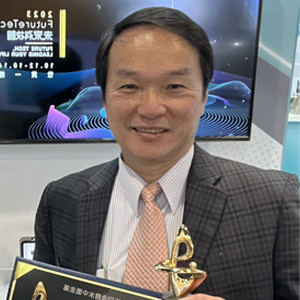Keynote Speaker

Prof. Ming-Chun Lu
Distinguished Professor, Department of Environmental Engineering, National Chung Hsing UniversitySpeech Title: Application of Fluidized-Bed Fenton Process for Industrial Wastewater Treatment
Abstract: Rapid population growth and technological advancements in various industries have led to the generation of significant volumes of wastewater requiring effective treatment. Among the available methods, advanced oxidation processes (AOPs) are highly favored due to their high efficiency, cost-effectiveness, and eco-friendly nature. These processes utilize non-selective hydroxyl radicals (•OH) to oxidize and degrade toxic pollutants in wastewater. Among the AOPs, the Fenton process has demonstrated exceptional efficacy in treating recalcitrant organic compounds. However, a key limitation of this process is the generation of large quantities of sludge, necessitating additional treatment and disposal. The fluidized-bed Fenton (FBF) process addresses this issue by crystallizing iron onto the surface of carriers within the reactor, significantly reducing sludge production.
This presentation provides a comprehensive overview of recent advancements in applying the FBF process to treat industrial wastewater. Case studies are explored across sectors such as thin-film transistor liquid crystal display manufacturing, pharmaceuticals, textiles, phenol production, refractory organics, petrochemicals, and other chemical industries. These examples underscore the potential of FBF technology to effectively reduce recalcitrant organic contaminants in wastewater. Key advantages of the FBF process over conventional Fenton-based technologies are highlighted, including improved performance, optimized operating conditions, and critical factors influencing removal efficiency. Additionally, the presentation delves into the reaction kinetics and mechanisms involved, along with the characteristics and selection of carrier materials used in the process. Finally, insights into large-scale applications of the FBF process are discussed, showcasing its viability and adaptability in addressing the challenges of industrial wastewater treatment on a broader scale.
Biography: Prof. Ming-Chun Lu is a Distinguished Professor in the Department of Environmental Engineering at National Chung Hsing University, Taiwan. He has served as an editor for Desalination since 2024 and has been an associate editor for Sustainable Environment Research since 2015. His outstanding achievements have been widely recognized with numerous honors. These include the Platinum Award at the Taiwan Innotech Expo Invention Competition in 2023 and 2024, the prestigious Future Technology Award from the National Science and Technology Council in both years, and the Outstanding Advisor Award for College Student Research and Creativity in 2023. He also led his team to win the championship in the Net-Zero Carbon Technology International Competition hosted by the TECO Technology Foundation in 2023 and was honored with the Outstanding Engineering Professor Award by the Chinese Institute of Engineers the same year. Professor Lu's research interests encompass advanced oxidation processes for water and wastewater treatment, fluidized-bed crystallization technology for treating wastewater containing metallic and non-metallic salts, and carbon dioxide capture from flue gas. He is also an innovator in developing disinfection, deodorization, antimicrobial, and antifungal technologies, as well as oil emulsification and desulfurization techniques. His work not only addresses pressing environmental challenges but also provides sustainable solutions that drive technological advancements.
